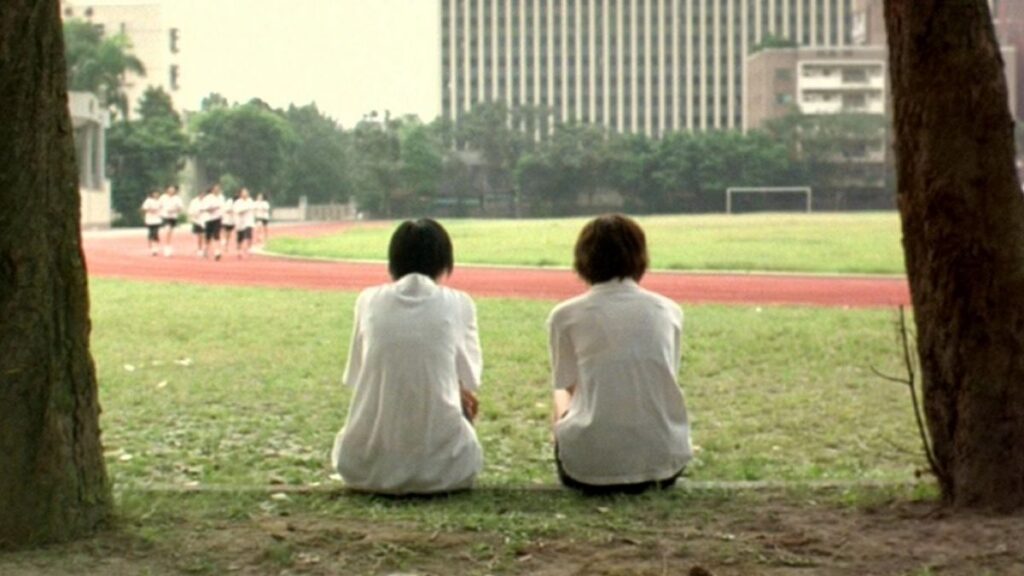This movie explores themes such as young love, mature, as well as immature behaviour. It looks at how young people deal with the nagging pangs of young love, of yearning, and of forbidden feelings; both giving in to as well as hiding them. This also reminded me of another 1990s coming-of-age romance called “Heavenly Creatures” featuring Kate Winslet and Melanie Lynskey. That film also delves into similar themes, and also explores the homosexual relationship developing between its two female leads in a sensitive manner.
“Blue Gate Crossing” opens in on two friends Meng Kerou and Lin Yeuzhen, discussing who their future love interests/husbands will be. While gazing dreamily at a group of boys at their school, Yeuzhen opens up to Meng that she has decided that the boy in the colourful T-shirt—the brooding Zhang Shihao—will be her future husband. After a few wistful glances towards him, the shy Yeuzhen tries to convince Meng to write and talk to him on her behalf. However, this only leads to a falling out between the girls after one such letter Meng writes is made public to the school. Shihao himself teases Meng about it, thinking she is the one secretly harbouring a ‘schoolgirl’ crush towards him. It is Yuezhen who is actually the one with the crush.
Shihao begins pursuing Meng at her mother’s dumpling shop until she agrees to a date with him. However, one awkward date later, Meng realizes that she isn’t as in tune with her sexuality as she thought. She can’t come out of the closet either without hurting Yeuzhen, Shihao, and herself in the process. Finding no way out, Meng, who is still coming to terms with her own sexuality, has to choose between confessing her feelings for her friend Yeuzhen (whom she secretly pines for) and fending off a hurt Shihao who begins nursing a broken heart from being led on by her after she lets him in on her ‘secret.’

These characters are relatable to today’s youth. They all deal with their emotions as young people do, in often immature and unhealthy ways. They ignore or repress their feelings until a deep depression sets in, or they are faced with a difficult situation. The movie also explores themes such as loneliness and the sacrifices one has to make for love. Youths who are unlucky in love can relate. I appreciated Meng’s conversation with Shihao, about how difficult it is for her to express herself to Yuezhen. To come clean about what she considers to be ‘unnatural pangs’ towards her best friend. She seems to envy Shihao, and thinks he is lucky he can love freely instead of in a forbidden manner. He doesn’t have to hide his feelings, since society is more accepting of heterosexual romance.
The chemistry and friendship between the actors playing Yeuzhen and Meng (Yolin Liang and Gwei Lun-Mei) is beautiful. Whether they are just hanging out at the school, biking, standing up for each other or even slow dancing playfully. Bo-Lin Chen portrays Shihao with the right amount of angsty, confused teenager energy without going overboard. Overall, all of the performances feel natural.
The movie also benefits from a soothing musical score by Chris Hou. The classical piano music works well with the innocence of the three teens who are just going with the flow on their respective journeys. They fall in and out of love, while at the same time maturing and coming to terms with all the new feelings that they can’t control, nor make sense of.
*”Blue Gate Crossing” is currently available to watch on Amazon and Netflix.


